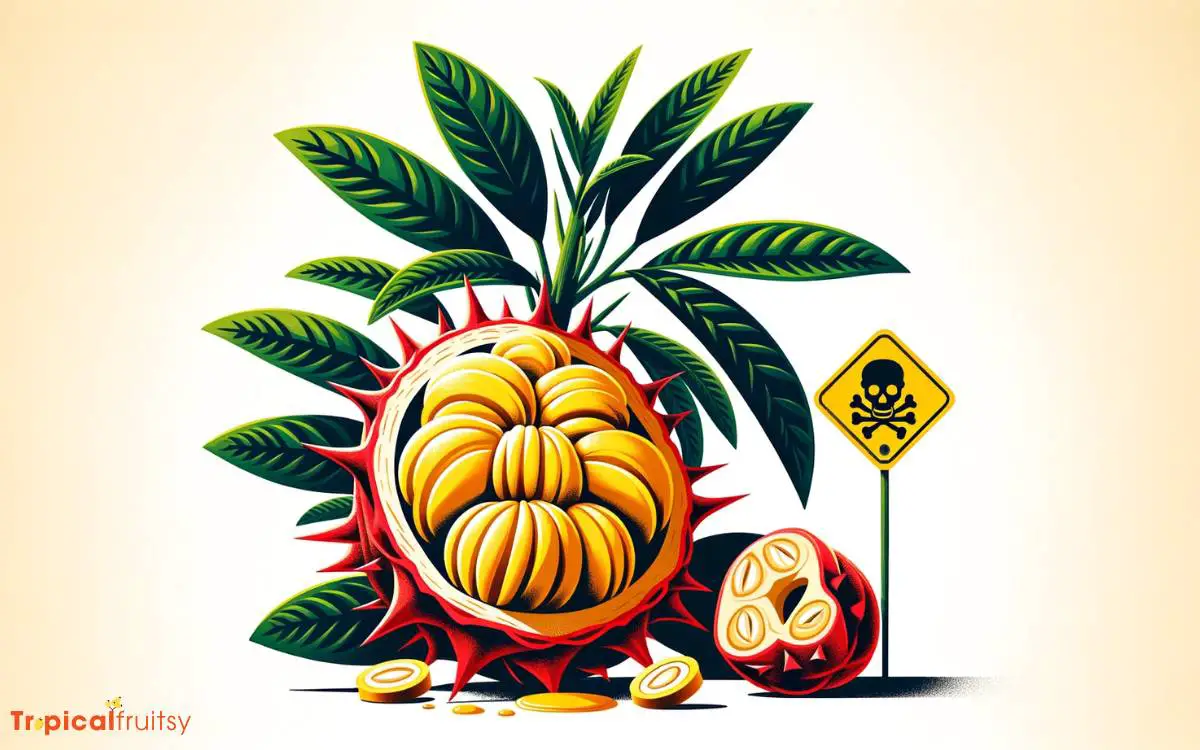Can Dogs Eat Cooked Ackee? Explained!
Ackee, the national fruit of Jamaica, is renowned for its unique flavor and is a staple in Caribbean cuisine. However, when considering its introduction into a canine diet, caution is paramount.
The fruit contains hypoglycin A and B, compounds that can induce hypoglycemia and are toxic when ingested in their unripe form.
While cooking ackee may reduce its toxicity, the question remains whether it is safe and appropriate for canine consumption.
This article aims to elucidate the potential effects of cooked ackee on dogs, provide guidelines on preparation if deemed suitable, and discuss alternative fruits that may be safer for dogs.
Expert opinions will be referenced to offer a comprehensive understanding of the implications of feeding dogs cooked ackee.

Key Takeaway
Considerations for Feeding Cooked Ackee to Dogs
| Aspect | Details |
|---|---|
| Safety of Cooked Ackee | Cooked ackee can be safe for dogs, but only if it’s fully ripe and prepared properly. Unripe ackee contains hypoglycin A, which is toxic. |
| Nutritional Value | Ackee is nutritious, but its benefits for dogs specifically are not well-documented. |
| Recommended Quantity | If feeding ackee to dogs, it should be in very small amounts due to its rich nature and potential unfamiliarity to the dog’s digestive system. |
| Preparation Method | Ensure ackee is thoroughly cooked and free from any seasonings, spices, or added ingredients that can be harmful to dogs. |
| Veterinary Advice | Consult with a veterinarian before introducing ackee or any new food to your dog’s diet. |
Understanding Ackee and Its Toxins

Within the flesh of the tropical ackee fruit lie potent toxins, notably hypoglycin A, which can cause severe health complications if ingested improperly.
Ackee, the national fruit of Jamaica, is only safe to consume when fully ripe and properly prepared.
Hypoglycin A is a naturally occurring amino acid, which can induce hypoglycemia by inhibiting the body’s ability to release glucose from glycogen stores.
Furthermore, this toxin can disrupt fatty acid oxidation, leading to the accumulation of harmful compounds in the body.
This condition, known as Jamaican Vomiting Sickness, is characterized by vomiting, lethargy, and even fatal outcomes in severe cases.
Understanding the biochemical implications of hypoglycin A is crucial for clinicians advising on dietary inclusions, especially in non-human diets such as those of canines.
The Effects of Ackee on Dogs

When dogs ingest ackee, even in its cooked form, they may experience toxic effects due to the presence of hypoglycin A, which can be particularly harmful to their health.
Ackee contains this toxin, which interferes with the body’s ability to utilize fatty acids and can precipitate a drop in blood sugar levels.
Ingesting ackee may cause the following clinical signs in dogs:
- Vomiting and Diarrhea: Gastrointestinal upset is a common reaction to toxic substances.
- Lethargy: A decrease in energy levels or alertness may be observed.
- Hypoglycemia: The hypoglycin A in ackee can lead to dangerously low blood sugar levels.
- Severe Muscular Weakness: This can result from metabolic disturbances caused by the toxin.
Immediate veterinary care is crucial if a dog exhibits symptoms after consuming ackee.
Preparing Ackee for Canine Consumption

Despite the potential risks, there is no safe method to prepare ackee for canine consumption due to the inherent presence of the toxin hypoglycin A.
This compound, even in cooked ackee, can induce severe metabolic disturbances in dogs, such as hypoglycemia, which is characterized by a dangerous drop in blood sugar levels.
The preparation of the fruit, whether by traditional culinary methods or otherwise, does not neutralize the toxin sufficiently to render it safe for dogs.
Consequently, veterinary nutrition experts strongly advise against offering ackee to dogs in any form.
Pet owners must be aware that the ingestion of ackee can lead to toxic effects, and therefore, it should be completely excluded from a dog’s diet to safeguard their health.
Safer Fruit Alternatives for Dogs

Understanding the dangers that ackee poses to our canine friends, it is critical to explore safer fruit alternatives that can be enjoyed without risk. Fruits offer various nutritional benefits, but it is essential to recognize which are suitable for dogs.
Here is a list of dog-friendly fruits:
- Apples (without seeds or core): A source of vitamins A and C, and fiber.
- Bananas: High in potassium, vitamins, biotin, and fiber, they are low in cholesterol and sodium.
- Blueberries: Antioxidant-rich and beneficial for canine immune systems.
- Watermelon (seedless): Hydrating and packed with vitamins A, B6, and C, as well as potassium.
Only provide these fruits in moderation to prevent gastrointestinal upset and ensure they do not constitute more than 10% of a dog’s daily diet.
Is Boiled Ackee Safe for Dogs to Eat?
Yes, boiled ackee is safe for dogs to eat as long as it is prepared properly and the boiling time for ackee is at least 15 minutes to remove toxins. It’s important to ensure that the ackee is fully cooked before feeding it to your dog to avoid any potential health risks.
Expert Recommendations on Ackee Feeding

How should dog owners approach the idea of feeding their pets cooked ackee, considering the potential health risks associated with this fruit?
Experts in veterinary nutrition typically advise against incorporating ackee into a dog’s diet, due to the potential for toxicity.
The fruit contains hypoglycin A, a compound that can cause severe hypoglycemia and even lead to fatal toxicity in dogs.
Therefore, the consensus among professionals is to err on the side of caution and completely avoid feeding ackee to dogs.
| Expertise | Recommendation | Rationale |
|---|---|---|
| Veterinary | Avoid Ackee | Hypoglycin A toxicity |
| Nutritionist | Offer Alternatives | Ensure dietary safety |
| Toxicologist | Monitor for Symptoms | Quick response in case of accidental ingestion |
| Research | Limited Studies | Insufficient data on safe consumption |
| Canine Health | Prioritize Safety | Avoid unknown dietary risks |
Conclusion
Ackee contains hypoglycin A, which can induce severe toxic effects in dogs. Proper preparation may reduce risk, but does not guarantee safety.
Veterinary professionals discourage ackee as a canine dietary component, advocating instead for fruits with established safety profiles.
The echoes of past misfortunes where dogs have been adversely affected by this fruit should guide pet owners towards more prudent, scientifically endorsed nutritional choices for their companions.






